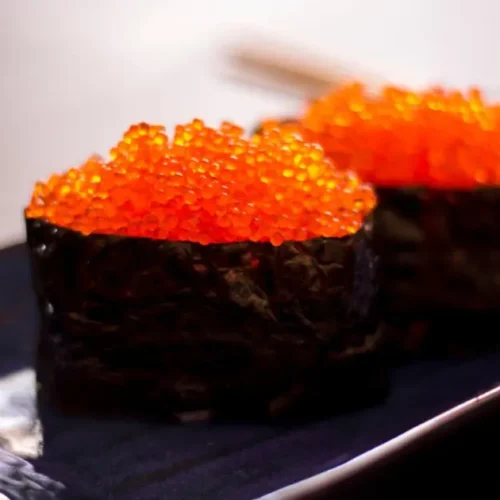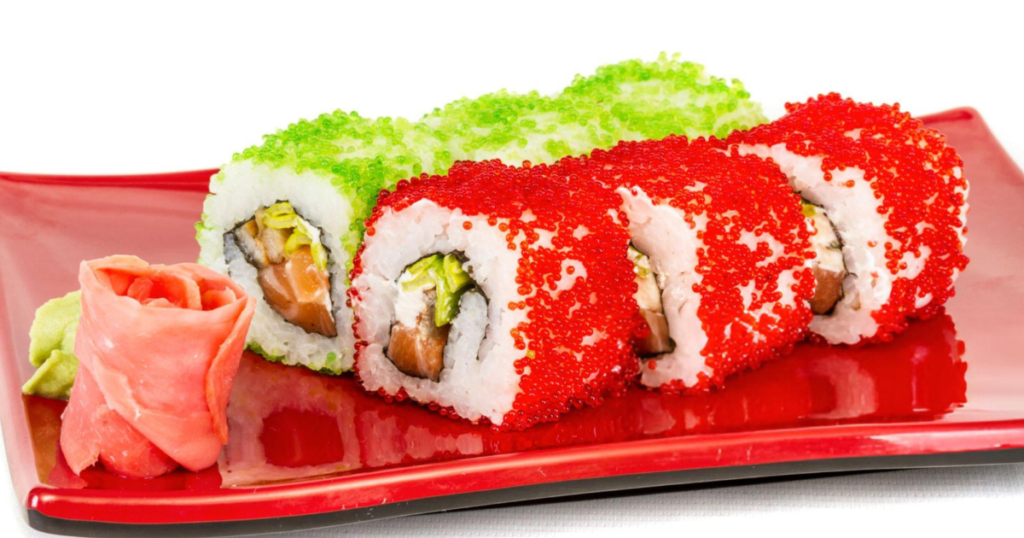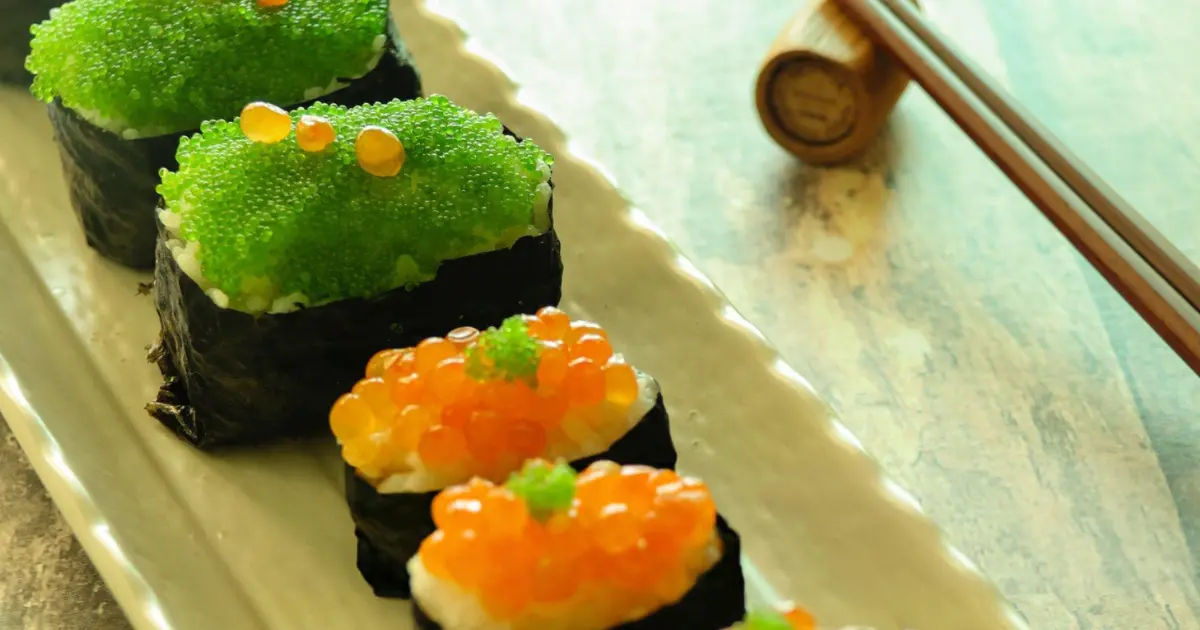Hey sushi adventurers! 🐟 Ever dreamed of turning your kitchen into a Tokyo-inspired flavor playground?
My first bite of tobiko in a tiny Japanese restaurant was pure magic – these tiny fish eggs are about to transform your tobiko sushi game from basic to brilliant! We’re not just making a recipe; we’re creating an edible masterpiece to make your taste buds dance. 🍣✨
Ready to become a home sushi sensei? Let’s roll! 🥢

Tobiko
Equipment
- Bamboo sushi mat
- Sharp chef's knife.
- Rice cooker or medium saucepan
- Cutting board.
- Small bowl for rice vinegar mixture
- Plastic wrap
- Kitchen towel
Ingredients
- 2 cups Sushi Rice
- 1/4 cup Rice Vinegar
- 2-3 sheets Nori Sheets
- 1/2 cup Tobiko (Flying Fish Roe)
- 1/2 pound Sushi-Grade Fish
- 1/2 medium Cucumber
- 2 oz Cream Cheese
- 1 tbsp Wasabi Paste
- For serving Soy Sauc
Instructions
- Prepare sushi rice
- Spread rice on nori
- Add fish and vegetables
- Roll tightly
- Slice into pieces
- Sprinkle tobiko on top
Table of contents
What is Tobiko Sushi?
Hey, sushi adventurers! 🐟 Let me introduce you to the vibrant world of Tobiko Sushi—a culinary gem that’ll transform your home cooking into a restaurant-worthy experience. Tobiko (とびこ) are gorgeous, tiny flying fish eggs that add a burst of color, texture, and oceanic flavor to your sushi creations.
My first encounter with tobiko was a trip to Tokyo’s small, bustling sushi restaurant. The chef delicately sprinkled these bright orange-red eggs over a roll, and I was mesmerized by how something so small could pack such a flavor punch!
Instructions: Your Epic Tobiko Sushi Adventure 🐟🍱
Rice Preparation: The Foundation of Sushi Greatness
Hey, sushi fish eggs warriors! 👨🍳 Let’s talk rice – and not just any rice. We’re creating the holy grail of sushi foundations to make your rolls sing!
Step-by-Step Rice Magic:
- The Washing Ritual
- Measure out 2 cups of short-grain Japanese rice
- Place in a fine-mesh strainer
- Rinse under cold water, using your fingers to swirl gently
- Pro Tip: Keep rinsing until the water runs crystal clear – we’re talking pristine, like a mountain stream!
- This removes excess starch and prevents sticky, clumpy rice disasters
- Cooking Perfection
- The ratio is everything: 1 cup rice to 1.1 cups water
- If using a rice cooker, press start and let technology do its magic
- Stovetop method? Low heat, covered pot, 18-20 minutes of patience
- Once cooked, let it rest for 10 minutes – rice needs a moment to collect itself, just like we do after a long day!
- The Vinegar Transformation
- In a small bowl, mix:
- 1/4 cup rice vinegar
- 2 tablespoons sugar
- 1 teaspoon salt
- Microwave for 30 seconds to dissolve sugar
- Gently fold into warm rice
- Use a cutting motion, not stirring – we’re being delicate here!
- Fan the rice while mixing to create that glossy, restaurant-worthy shine
- In a small bowl, mix:
Sushi Roll Assembly: Become the Sushi Sensei 🥢
Nori Placement Mastery
- Lay bamboo mat on a clean surface
- Place nori sheet shiny-side down
- Pro Ninja Move: Cover the mat with plastic wrap for easier cleaning
Rice Spreading Technique
- Wet your hands in a mix of water and rice vinegar
- Spread rice evenly, leaving a 1/2-inch border at the top
- Thickness matters! Aim for a thin, even layer – think delicate blanket, not rice mountain
Filling Like a Pro
- Protein Placement
- Lay thin strips of sushi-grade salmon or tuna
- Aim for even distribution
- Thickness: No more than 1/4 inch thick
- Veggie Crunch
- Cucumber strips: Seedless, cut into matchsticks
- Pro Tip: Remove cucumber seeds to prevent soggy rolls
- Placement: Down the center, creating a flavor and texture bridge
- Optional Cream Cheese Layer
- Thin schmear along one side
- Adds creamy richness that’ll make taste buds dance!
The Sacred Rolling Technique
- Use a mat to lift the bottom edge of the nori
- Gentle but firm pressure
- Roll away from you, tucking ingredients tight
- Use a mat to shape and compress
- Give a final gentle squeeze to seal
Cutting Ceremony
- Wet your sharpest knife with water
- Slice roll in half, then quarters, then eighths
- Clean knife between cuts for pristine edges
Tobiko Finale: The Glorious Egg Shower 🥚
- Gently sprinkle tobiko over rolls
- Use clean, dry hands
- Think of it like you’re a culinary fairy dusting magic flavor crystals!
Kitchen Warrior Pro Tip: Practice makes perfect. Your first roll might look like a delicious disaster, but by the third, you’ll be a sushi sensei! 🥇
Tips and Tricks: Your Sushi Sensei Secrets 🥢✨
Hey, sushi adventurers! 🐟 Let me spill the beans (or should I say the fish eggs?) on how to transform from a kitchen novice to a Tobiko Sushi master!
Rice Rescue Mission 🍚
- Temperature is Everything: Sushi rice is like a temperamental diva – it needs to be just right!
- Too hot? Bye-bye, tobiko texture
- Too cold? Say hello to clumpy, sad rice
- Pro Move: Use a fan or a magazine to cool the rice quickly while folding it in vinegar
- My Grandma’s Secret: Always fold, never stir – treat the rice like it’s a delicate dance partner!
Knife Skills: The Sushi Samurai Technique 🔪
- The Wet Knife Trick:
- Keep a bowl of water + rice vinegar mix nearby
- Wipe your knife between each cut
- This prevents rice from sticking and gives you those Instagram-worthy clean slices
- Think of your knife as a precision instrument, not a hack-and-slash tool
- Slow and steady wins the sushi presentation game!
Tobiko Handling: Treat Them Like Culinary Jewels 💎
- Gentle Touch Wins:
- Tobiko is delicate – think butterfly wings, not rugby balls
- Use clean, slightly damp fingers
- Sprinkle from just above the roll for that chef-like cascade effect
- Store tobiko in the coldest part of your fridge
- Pro Tip: Always buy from a trusted seafood source – freshness is key!
Flavor Bomb Secrets 💥
- Mixing Magic:
- Try mixing tobiko with a tiny bit of sriracha for a spicy twist
- A drop of sesame oil can elevate your tobiko game
- Experiment like a mad scientist – cooking is an art, not a science textbook!
Tobiko Sushi Serving Suggestions: Make Every Plate a Masterpiece 🍽️
The Ultimate Fish Egg Sushi Presentation Playbook
Hey flavor explorers! 🚀 Serving sushi isn’t just about taste – it’s about creating an experience that’ll make your guests go “WHOA!”
Plating Like a Pro
- Color is King:
- Choose a plate that makes your tobiko pop
- White plates are classic for a reason – they’re like a canvas for your sushi art
- Dark plates? They’ll make those bright tobiko eggs look like edible gems!
Accompaniment Symphony
- Beyond Wasabi and Soy:
- Pickled Ginger Station:
- Arrange in a delicate pile
- Pro Move: Use a small, beautiful ceramic dish
- Tip: The ginger cleanses your palate between bites
- Soy Sauce Situation:
- Use a small dipping bowl
- Pro Tip: Pour just a little – you can always add more!
- Recommendation: Low-sodium soy sauce for a more nuanced flavor
- Wasabi Wisdom:
- A tiny dollop goes a long way
- Mix directly on your plate for a custom heat level
- Warning: Wasabi is not for the faint-hearted! 🔥
- Pickled Ginger Station:
Drink Pairings That’ll Blow Your Mind 🍶
- Sake Suggestions:
- Chilled Junmai Ginjo sake = Sushi’s best friend
- Non-alcoholic? Green tea is your go-to!
Mood Matters
- Sushi is an Experience:
- Soft background music
- Good lighting
- Clean, minimal table setting
- Make every bite feel like a mini celebration!
Quick Styling Tricks
- Use microgreens as a garnish
- A small wedge of lemon
- Chopsticks are placed just so
- It’s about creating a moment, not just a meal!
Variations and Alternatives
- Vegetarian Option: Replace fish with avocado or salmon
- Spicy Tobiko Roll: Mix tobiko with sriracha
- Different Roe: Try masago or ikura for Variety

Nutritional Information (per serving)
- Calories: Approximately 220
- Protein: 15g
- Carbs: 25g
- Healthy Omega-3 Fats: ✓
FAQ
Q: What exactly is Tobiko? Are these fish eggs?!
A: Absolutely! Tobiko are the rock stars of the fish egg world – tiny, bright flying fish eggs that add a pop of color and flavor to your sushi. Think of them as nature’s flavor bombs! 💥 They’re typically bright orange but can come in fun variations like green (wasabi), black (squid ink), or even red. Each egg is like a tiny flavor pearl that pops in your mouth!
Q: Is Tobiko Raw? Is It Safe to Eat?
A: Great safety question, sushi adventurer! Tobiko is typically flash-frozen, which kills potential parasites. Most reputable sushi restaurants and fish markets ensure their tobiko is completely safe. Pro tip: Always buy from trusted sources, and when in doubt, ask your fishmonger about their sourcing and freezing process.
Q: How Long Can I Store Tobiko Sushi?
A: Treat tobiko like a culinary diva – it needs special care!
- Unopened: Up to 6 months in the freezer
- Once opened: Use within 2-3 days when refrigerated
- Storage Secret: Keep it in the coldest part of your fridge
- Warning: Never leave at room temperature for more than 2 hours
Q: Can I Make Tobiko Sushi If I’m a Total Beginner?
A: Kitchen confidence is your secret weapon! 🥢
- Start small: Maybe try a simple roll first
- Watch online tutorials
- Don’t fear the mess – every sushi chef started exactly where you are
- Pro Beginner Tip: Your first roll might look like a delicious accident, but it’ll taste amazing!
Q: Are There Vegetarian Tobiko Options?
A: While traditional tobiko is fish eggs, some creative alternatives exist:
- Vegetarian “tobiko” made from seaweed
- Agar-based egg substitutes
- Masago (another type of fish roe) is an alternative
- Pro Tip: Always check ingredient labels!
Q: How Spicy Are Tobiko Eggs?
A: Classic tobiko is more about texture than heat!
- Natural tobiko: Mild, slightly salty flavor
- Wasabi tobiko: Adds a spicy kick
- You can control the heat by choosing your tobiko variation or mixing in your spices
Q: Can I Freeze Homemade Tobiko Sushi?
A: Proceed with caution, sushi explorer!
- Raw fish sushi: Not recommended for freezing
- Best practice: Enjoy fresh within 24 hours
- If you must store, refrigerate, and consume quickly
- Pro Storage Hack: Separate rolls, and wrap them individually in plastic wrap
Q: What’s the Difference Between Tobiko, Masago, and Ikura?
A: Roe Roster, coming right up! 🐟
- Tobiko: Smallest, bright orange flying fish eggs
- Masago: Slightly smaller, often used in California rolls
- Ikura: Large, salmon eggs with a more intense flavor
- Think of them like the cousins in the fish egg family – related, but each with a unique personality!
Q: How Many Calories Are in flying fish roe?
A: Flavor without massive calorie guilt!
Nutritional superstar in tiny, delicious packages!
About 40 calories per tablespoon
High in protein
Rich in omega-3 fatty acids
Who Should Skip This Recipe?
- People with shellfish allergies
- Those with raw fish sensitivities
- Strict vegetarians
- Individuals on very low-sodium diets
My Personal Touch
Cooking is about joy, experimentation, and sharing. This recipe isn’t just about food – it’s about creating moments, memories, and connections. Every time I make sushi, I’m transported back to that tiny Tokyo restaurant, feeling the excitement of culinary discovery.
What Do You Think?
Tried this Tobiko Sushi recipe? Hey, flavor warriors! 🌊 We’ve just unlocked the magical world of Tobiko Sushi – and this isn’t just a recipe, it’s your ticket to culinary rockstar status!
Every roll tells a story, and every bite is an adventure. Those tiny, glistening fish eggs are your passport to creativity, transforming your kitchen into a sushi playground. Don’t worry about perfection – embrace the mess, celebrate the flavor, and let your inner chef shine!
Ready to turn ordinary ingredients into extraordinary memories? Grab those chopsticks and let’s make some magic! 🥢
Drop a comment below! Share your creation, ask questions, or tell me about your sushi adventure.





